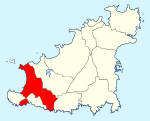Saint Peter Saint Pierre du Bois | |
|---|---|
 Location of Saint Pierre Du Bois in Guernsey | |
| Coordinates: 49°26′28″N2°38′28″W / 49.44111°N 2.64111°W | |
| Crown Dependency | Guernsey, Channel Islands |
| Government | |
| • Electoral district | West |
| Area | |
• Total | 6.2 km2 (2.4 sq mi) |
| Population (2019) | |
• Total | 2,036 |
| • Density | 330/km2 (850/sq mi) |
| Time zone | GMT |
| • Summer (DST) | UTC+01 |
| Website | stpierredubois |
St Peter's (Guernesiais: Saint Pierre), known officially as Saint Pierre du Bois (English: "St. Peter in the Wood"), is a parish in Guernsey. It is the centre for the Guernsey Western Parishes which includes Torteval, St Saviour's and the Forest.
Contents
The old Guernesiais nickname for people from Saint Pierre was etcherbaots which means beetles.
The postal code for street addresses in this parish begins with GY7.
St Peter's won the Britain in Bloom small coastal prize in 2015. [1] and a gold medal in the 2016 Champion of Champions competition. [2]

